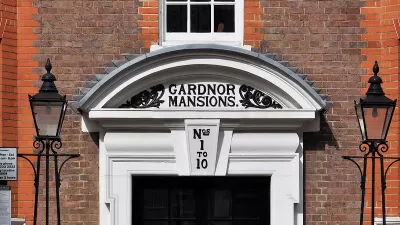During WWII, thousands of bicycles were stolen from the Dutch by occupying Germans, leaving them unable to get around. In Britain, however, strict patrol rationing meant bicycle use rose considerably because it was the only way to get around.
According to Joe Peach, "As soon as the Brits had the opportunity to get off their bicycles they did, with car ownership increasing rapidly in the post-war years, and continuing to remain high. This despite the fact that, as in the Netherlands, campaigns to improve London's bicycle provisions and encourage a return to bicycle use have been happening since the 1970s."
"Even during the earliest stages of the London Cycle Network, a lack of ambition was obvious, with the preface of the official design manual noting ‘the design of cycle facilities frequently requires a range of compromises to be made.' These compromises are not only clear in functionality, but in a failure to increase cycling. Ambitious goals to increase the amount of trips taken by bicycle from 1998 levels of 1.36% to 10% in 2012 have not been achieved, or even come close to being achieved," says Peach.
FULL STORY: How London Tried (and Failed) to Become a Cycling City

Planetizen Federal Action Tracker
A weekly monitor of how Trump’s orders and actions are impacting planners and planning in America.

Maui's Vacation Rental Debate Turns Ugly
Verbal attacks, misinformation campaigns and fistfights plague a high-stakes debate to convert thousands of vacation rentals into long-term housing.

San Francisco Suspends Traffic Calming Amidst Record Deaths
Citing “a challenging fiscal landscape,” the city will cease the program on the heels of 42 traffic deaths, including 24 pedestrians.

Defunct Pittsburgh Power Plant to Become Residential Tower
A decommissioned steam heat plant will be redeveloped into almost 100 affordable housing units.

Trump Prompts Restructuring of Transportation Research Board in “Unprecedented Overreach”
The TRB has eliminated more than half of its committees including those focused on climate, equity, and cities.

Amtrak Rolls Out New Orleans to Alabama “Mardi Gras” Train
The new service will operate morning and evening departures between Mobile and New Orleans.
Urban Design for Planners 1: Software Tools
This six-course series explores essential urban design concepts using open source software and equips planners with the tools they need to participate fully in the urban design process.
Planning for Universal Design
Learn the tools for implementing Universal Design in planning regulations.
Heyer Gruel & Associates PA
JM Goldson LLC
Custer County Colorado
City of Camden Redevelopment Agency
City of Astoria
Transportation Research & Education Center (TREC) at Portland State University
Jefferson Parish Government
Camden Redevelopment Agency
City of Claremont




























